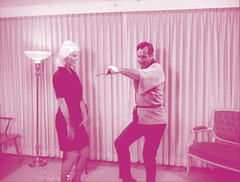Dec 21, 2009 3
Is Marketing Mainly Manipulation or Might It (also) Be Education?
 Last spring, while attending a lovely brunch, I got into an unexpectedly heated dispute with the host and one of the guests, professors at a local business college, about the Nazi philosopher, Martin Heidegger.
Last spring, while attending a lovely brunch, I got into an unexpectedly heated dispute with the host and one of the guests, professors at a local business college, about the Nazi philosopher, Martin Heidegger.
Having told me that they sometimes taught Heidegger’s essay, “The Question Concerning Technology,” to their students, I told them that Heidegger’s unrepentant allegiance to the Nazi cause, coupled with his very conscious desire to provide the philosophical groundwork for an as yet unrealized hyper-elitist society in which the Many served the Few, made such a pedagogical choice highly problematic.
To my way of thinking, I explained to them, introducing impressionable minds, or any minds for that matter, to the diabolical musings of the old, forest-dwelling, Swabian sorcerer was to fulfill his clearly articulated plans and, therefore, to be avoided at all costs.
Naturally, they thought me mad.
Flash forward to a recent dinner party featuring many of the same characters. Recalling our bygone dispute, one of my erstwhile protagonists found it ironic that I considered teaching marketing the better alternative to teaching Heidegger. Ascertaining that he equated marketing with manipulation I asked if he didn’t in fact try to manipulate his students, an imputation he vociferously rejected before absenting himself.
There ensued an illuminating discussion with his colleague concerning the way “marketing” had supplanted “sales” in the college’s curriculum. Whereas the institution had once upon a time striven to steep students in the subtle and not-so-subtle arts of persuasion proper to business, this was now deemed “kind of sleazy” and had been replaced with the more oblique, and ostensibly scientific, rigors of marketing.
On hearing this, I remarked that, funnily enough, with the ascendancy of “content marketing,” it was now education that provided sales and marketing with its dominant paradigm. And so we sat down to eat.
Customers don’t want to be marketed to anymore than they want to be sold to. They are, however, hungry for information, if not knowledge (or, perish the thought, wisdom). For this reason the contemporary marketer begins to increasingly resemble a research assistant or a reference librarian and, in some cases, a teacher.
Which is why I would like to suggest that, while education may, in its way, be manipulative, we must also allow that manipulation, in its turn, may also be, at times, educational.
Don’t you think?
Image Courtesy of coyote2012.




 Here’s my attempt to truly “live blog” a
Here’s my attempt to truly “live blog” a  Remember when I said that
Remember when I said that